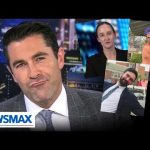The BBC quietly admitted what many of us suspected: its Panorama program aired a misleading edit of President Trump’s January 6 speech, stitching clips together in a way that omitted his calls for a peaceful protest and made him look like he was inciting violence. That admission prompted a rare apology from BBC Chair Samir Shah and the removal of the program from circulation, but the corporation has also tried to downplay the damage while the clock on accountability ticks.
This was not a small mistake or a simple production snafu — it was an editorial choice with political consequences, broadcast just days before a presidential election. Reports say the documentary spliced three separate sections of the speech to create a misleading narrative, and the BBC has since said it is sorry for the edit even as it defends the broader program. The public deserves to see the full context that was intentionally left out.
President Trump’s legal team responded the only way a serious man does when defamed: they demanded a retraction, an apology, and warned the BBC to pay up or face legal action seeking no less than one billion dollars in damages. Whether you support the man or not, every American should applaud anyone who pushes back against media institutions that use their power to shape elections and public opinion.
The BBC’s defensive posture — arguing the episode didn’t air in the United States, that it was merely shortening a long speech, and that political speech is protected — sounds convenient and rehearsed. Those legal arguments may be their attempt to dodge responsibility, but an apology alone does not fix the erosion of trust when a supposedly impartial broadcaster manipulates footage for political effect.
The fallout at the BBC has been immediate and deserved: senior executives, including the director-general and head of news, resigned amid leaked internal memos alleging systemic editorial failures. This is a wake-up call not just for the BBC but for any media outlet that believes it can act without consequences when it tips the scales of democracy. The people who decide what millions see and think must be held to account.
Let’s be honest: the mainstream media have treated President Trump and his supporters with a double standard for years, and this episode is another example of how far some outlets will go to manufacture a narrative. Conservatives and patriots should not cower when the press weaponizes half-truths; we should demand transparency, corrections, and if necessary, legal remedies to protect reputations and the integrity of public debate. Past settlements with other outlets show that the pressure works when it is applied.
Legal experts have noted there will be hurdles — jurisdictional questions, differing defamation standards, and statutory limits — but those obstacles are not a get-out-of-accountability-free card for powerful media institutions. If the American people find their democracy distorted by selective editing, there must be a pathway for redress, whether in Florida courts or elsewhere, and the law should reflect the seriousness of deliberate editorial deception.
This episode is about far more than one speech or one lawsuit; it is about whether free societies will tolerate an information cartel that edits history and punishes dissent. Patriots must stand firm for a fair and free press that reports facts, not frames them to fit a partisan agenda. If the BBC and its peers want to survive in the long run, they will start by returning to honesty, admitting wrongdoing beyond a PR statement, and facing real consequences for misleading the public.




